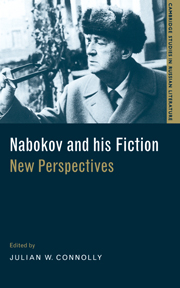Book contents
- Frontmatter
- Contents
- A note on the contributors
- A note on transliteration
- A note on abbreviations
- Acknowledgments
- Introduction: Nabokov at 100
- PART 1 ARTISTIC STRATEGIES AND THEMES
- PART 2 LITERARY AND CULTURAL CONTEXTS
- 7 Nabokov's (re)visions of Dostoevsky
- 8 Her monster, his nymphet: Nabokov and Mary Shelley
- 9 Vladimir Nabokov and Rupert Brooke
- 10 Clio laughs last: Nabokov's answer to historicism
- 11 Poshlust, culture criticism, Adorno, and Malraux
- Selected bibliography
- Index
- CAMBRIDGE STUDIES IN RUSSIAN LITERATURE
9 - Vladimir Nabokov and Rupert Brooke
Published online by Cambridge University Press: 18 December 2009
- Frontmatter
- Contents
- A note on the contributors
- A note on transliteration
- A note on abbreviations
- Acknowledgments
- Introduction: Nabokov at 100
- PART 1 ARTISTIC STRATEGIES AND THEMES
- PART 2 LITERARY AND CULTURAL CONTEXTS
- 7 Nabokov's (re)visions of Dostoevsky
- 8 Her monster, his nymphet: Nabokov and Mary Shelley
- 9 Vladimir Nabokov and Rupert Brooke
- 10 Clio laughs last: Nabokov's answer to historicism
- 11 Poshlust, culture criticism, Adorno, and Malraux
- Selected bibliography
- Index
- CAMBRIDGE STUDIES IN RUSSIAN LITERATURE
Summary
Nabokov spent the better part of three years in England. The family arrived in London at the end of May, 1919. Although the parents and three younger children resettled in Berlin in the summer of the following year, Vladimir and Sergei remained at Cambridge University, graduating in 1922. Nabokov first recounts his Cambridge years in “Lodgings in Trinity Lane.” All three versions of the memoirs and both of Nabokov's biographers show a young man immersed in the recreation of a lost Russian world and relatively indifferent to his English surroundings. Most of his Cambridge friends were Russian émigrés.
The young Nabokov saw himself as a Russian poet, and poetry was to be his major project during his Cambridge years. Already the author of two collections published in Russia, he had written many new poems during his sixteen-month Crimean exile. Nostalgic reconstructions of “his” Russia form the largest category of subject matter for the 1918–22 poems. So intent was Nabokov on this endeavor that little emotional energy was left over for England and Cambridge. Nabokov's first biographer, Andrew Field, quotes Nabokov as describing his Cambridge years as “a long series of awkwardness, mistakes, and every sort of failure and stupidity, including romantic.” In Speak, Memory, the author even insists that his Cambridge years “left such trifling impressions … that it would be tedious to continue” (SM, 261 [ch. 13]). Although aware of its imposing history, the young poet “was quite sure that Cambridge was in no way affecting my soul.” Nabokov later qualifies this, conceding that Cambridge supplied “not only the casual frame, but also the very colors and inner rhythms for my very special Russian thoughts” (SM, 269 [ch. 13]).
- Type
- Chapter
- Information
- Nabokov and his FictionNew Perspectives, pp. 177 - 196Publisher: Cambridge University PressPrint publication year: 1999

